MERRY CHRISTMAS, MR. LAWRENCE: War Crimes and Christmas Time
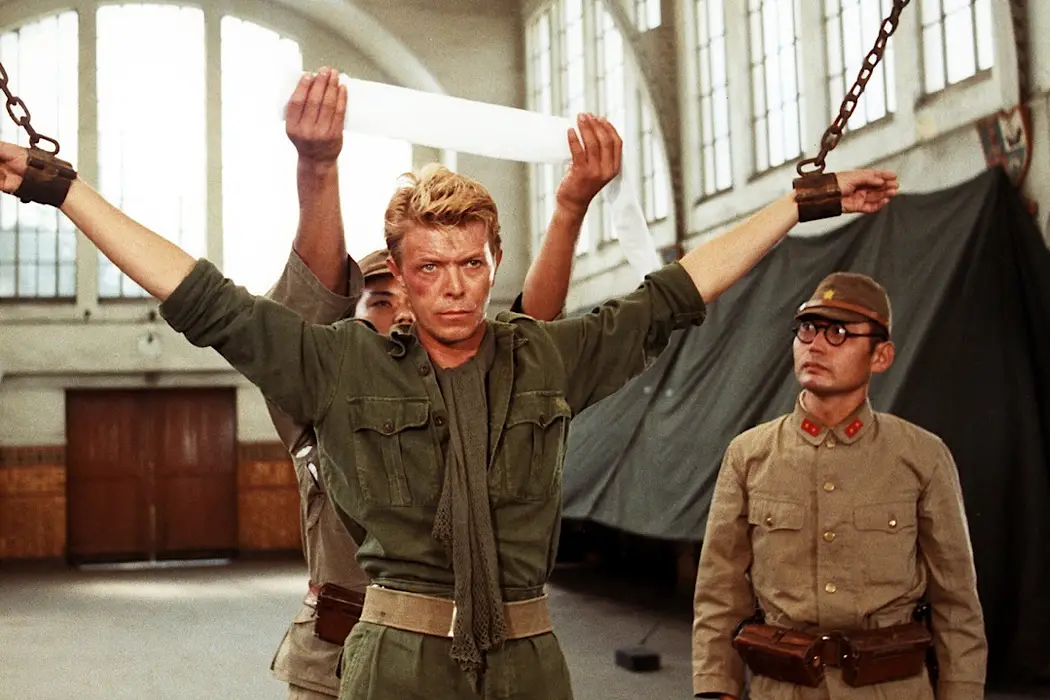
If there is one word that can sum up Dallas…
Imagine this. You’re a tired and hungry soldier, laying down on a dirty cot. Above you, a tin roof with bamboo rafters and palm leaves stitched together as a makeshift wall. It’s late at night, but you can hear various lizards scurrying about the walls as the humid island heat beats upon your already sweat-coated body as your clothing clings to you. You try to sleep, but you remember that letting your guard down here could have dire consequences; you “sleep with one eye open,” so to speak. Then, you hear the rickety door open without warning in the wee hours of the morning, and a strange-looking man in uniform comes in, brandishing a bamboo stick.
He speaks a language you cannot understand and looks nothing like the people you grew up with. The only thing you know about him is that he is your enemy and the worst part is, you are entirely at his mercy. He swings around the ad-hoc weapon to assert dominance and speaks his foreign language. One of your comrades, which is fortunate for you, can speak his language and tells you to stay where you are. But right before your comrade and the foreign man in uniform leave your hut, one of your fellow bunkmates speaks out of turn and, in a flash, is thrashed right across his face. Ruby-red blood trickles from his face as he yowls in pain and as you try to comfort him, the only thing you can do is curse your captor as the bastard walks off.

This is how Merry Christmas Mr. Lawrence starts, a 1983 war film about the experiences of a troop of British soldiers under the pernicious commandeering of the Imperial Japanese Army during World War II. This opening scene sets the mood for the rest of the film and is dualistic. On the one hand, there is a sense of quiet desperation from both the British and a few of the Japanese Army officials. On the other hand, it is a movie about hope and the power of Christmas.
The Grim Truth
For anyone reading who has studied World War II history in any extensive matter, the gravity of the situation is shown in Merry Christmas, Mr. Lawrence will come as no surprise. The fact is that the Axis Powers, especially the Japanese Imperial Forces, treated their prisoners of war with extreme prejudice. To paraphrase the war statistics from History on the Net, for every three POWs that were under the aggressive attention of the Japanese military, one POW would die. In other words, if you were a soldier who was captured by the Japanese, you had a 33% chance of not making it out alive. True grit and determination would be the only things that would keep one alive in such a dangerous situation. Serendipity would smile upon the eponymous lead of Lt. Col. John Lawrence. He, due to his fluency in Japanese, acts as a go-between for the English soldiers, which would lessen the brutality that his men would suffer at the hands of their foreign enemy.
So why the brutality? Why the senseless violence? Because while Japan was going through its nationalistic period, the Japanese government during World War II resurrected very jingoistic forms of Bushido and Shintoism. Bushido is the warrior code of the samurai, and Shinto is the indigenous religion of Japan. And no character exemplifies these qualities most, albeit with a softer and conflicted light, as Capt. Yanoi, as played by Ryuichi Sakamoto.
Yanoi, albeit as hardnosed and astringent as he comrades in arms, is, in his own way, likeable. He practices a more polite version of Bushido, where petty aggression is viewed as dishonorable and that anyone who acts in an uncouth way under the care of his camp is met with harsh punishment. Although he tries to mitigate a lot of the harm in his camp, even going so far as apologizing for improper behavior, he cannot escape the fact that he is aiding and abetting a corrupt system. Yanoi is the definition of a good man who is in a bad place.
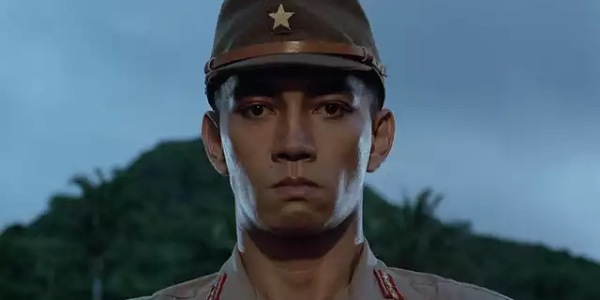
Beneath the calm and collected demeanor of what Yanoi believes, as a picturesque and gentlemanly samurai is supposed to act, lies grim truths that he does not want to admit. Yanoi is a very conflicted man. And that conflict is what makes this film captivating.
The Forbidden Colors of Homosexuality
Merry Christmas, Mr. Lawrence touches on many topics such as culture shock, the dehumanization of war, but a stark contrast, when compared to other films of similar ilk, is its discussion on homosexuality. A frame of reference is in order because how the Japanese viewed homosexuality circa 1943 was very different from how the English viewed male-on-male relations. One scene, in particular, exemplifies this when an English soldier of Lawrence’s battalion confesses that a Japanese guard raped him. Although the guard, as ordered by Yanoi, is to be executed for this shameful act, the English prisoner of war is conflicted by the decree and is even stricken with grief over the inevitable execution-by-seppuku that must take place.
The abrasive second-in-command, Sgt. Gengo Hara, chides both Lawrence and the guard by questioning why the British are so afraid of homosexuality. “A samurai doesn’t fear it!” he says in a stern tone while puffing on a cigarette. This view of homosexuality is not new for the Japanese, as one can look at the samurai history in Japan and see that there were homosexual relations between men in the samurai class. Certain books about Bushido even go so far, such as the Hagakure, to explain how a senior samurai and his retainer are supposed to go about a homosexual relationship if the need should ever arise. In pockets of Japanese culture, male-on-male relationships were not viewed as shameful but as a means of building bonds between men, especially when those men were brothers in arms.
This is where Maj. Jack Celliers comes in, played with fantastic charm by the late David Bowie. Jack Celliers is a fellow captive and friend of Lawrence, and he is first introduced at a military tribunal head by the Japanese Army. One of the men at the tribunal is none other than Capt. Yanoi himself, who upon seeing Celliers, in an instant falls for him. In the eyes of the Japanese Army, homosexuality is one thing, but for a Japanese soldier to fall for an enemy, that is something else entirely. But, to be fair to poor Yanoi, as I paraphrase the bible, is not lust for David Bowie something that unites all nations, tribes, peoples, and tounges?
David Bowie’s portrayal of Jack Celliers is the best part of Merry Christmas, Mr. Lawrence. He captivates the screen in every scene he’s in and even amidst the abuse and sadness that surrounds him, he always finds a way to not only raise his own spirits but the hearts and minds of his fellow captives. And although Yanoi believes he is guarding his heart, Celliers knows how he really feels and compassion for Yanoi and his brainwashed state are a part of Celliers’ personality. Nothing can break Celliers, his resolve is too strong.
Yanoi, for the most part, keeps his desires close to the vest, but others within the camp can tell that something is amiss about Yanoi and Celliers. Yanoi treats Celliers better than the other prisoners, watches him sleep, and asks his second in command how Celliers is faring. Of course, a few of the Japanese soldiers notice such preferential treatment, and one of them even goes so far as to state that the handsome Celliers must be some malevolent being to sway the stoic Yanoi into sympathizing with the enemy. Yanoi, with such a battle raging in him, asks Celliers a question in one scene:
Yanoi: “Who do you think you are? Are you an evil spirit?”
Celliers: “Yes. One of yours, I hope.”
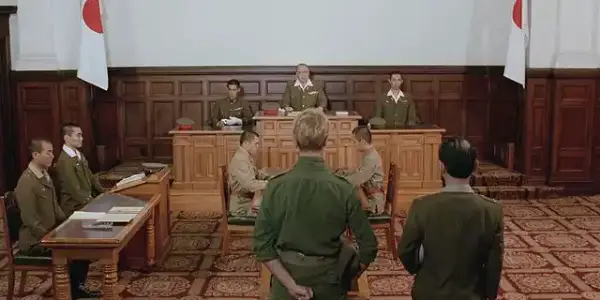
Such pithy responses are not without meaning, for beneath a story of forbidden desire belies an examination of culture shock, especially regarding one of the most dangerous yet intimate relationships between humans: war.
A Dangerous Cultural Exchange
Behind the camera of this cultural examination is the keen eye of Nagisa Oshima. Being a film director who was known to rock the boat, Oshima was a rabble-rouser, political activist, and most pertinent to the topic at hand, a strong critic of Japanese culture, particularly when it comes to the island nation’s propensity to xenophobia. His exploration of the Japanese obsession with isolating itself from the world is nothing new. One of his earliest films, The Catch, released in 1961, also deals with a prisoner of war who happens to be an African-American soldier. Taking such robust approaches was the bread-and-butter of Oshima’s filmography, shining a light on the collective paranoia in which aspects of Japanese culture are firmly entrenched.
Oshima exposed that same mental paranoia of Japanese thought via his criticism of repression, especially that of the sexual kind. His most recognized, controversial, and internationally received work was a film called In the Realm of the Senses. Released in 1967 and dubbed as a “pornographic art film,” the plot revolves around a young couple in 1930s Japan who feel so alienated and withdrawn from Japanese society at large. The couple, unable to cope with their repression and alienation, indulge in sexual exploits to the point of death. The female lead, being a survivor, castrates her male lover and holds his dismembered penis in a bag.
This film is biographical, based on the real-life account of Sada Abe, a prostitute who did murder her male lover and carry his member around in her kimono. Oshima viewed the madness of that young woman as a by-product of the Japanese obsession with saving face or their warped sense of “death before dishonor.” And while Merry Christmas, Mr. Lawrence is not nearly as extreme as In the Realm of the Senses, his exploration of collective mental illness is explored with a scathing microscope all the same. Only this time, it is done through foreigners’ eyes, from the viewpoint of those who are not a part of the collective Japanese psyche.
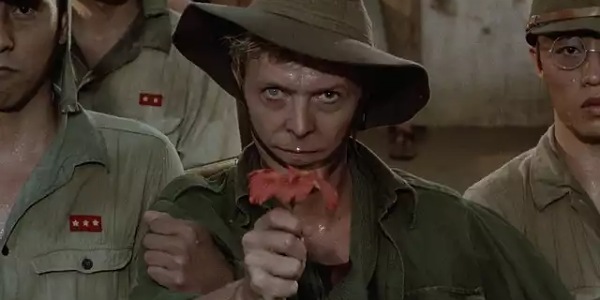
Apart from the common thread of emotional repression in Oshima’s filmography, Merry Christmas, Mr. Lawrence is a dangerous cultural exchange of how the madness of fanaticism bleeds into every aspect of life. The British soldiers in question are shown to be more virtuous and willing to work with their Japanese captors than the other way around, but this film does more than discuss the madness of militarism. The crisis of chest-puffing masculinity and how different cultures see manhood are also on display, and its tragic results. Two characters on the Japanese side portray two dangerous forms of masculinity and suffer the consequences: Capt. Yanoi and Sgt. Hara. Yanoi is an exemplary Japanese soldier; stoic, controlled, leading every situation with aplomb. Until he meets Celliers and falls for him, his role as a patient leader is threatened and he has a complete nervous breakdown in the latter half of the film, his mind unable to cope with the cognitive dissonance.
Sgt. Hara (played by the famous Japanese comedian Takeshi Kitano in his first dramatic role) exudes the tough guy act as the right-hand man of Yanoi. He is coarse, violent, and is always crowding whatever room he is in to assert his dominance. But the film does not just present him as a pure brute there are moments where he tries to understand the mindset of his enemies. Since Lawrence is the only one of the British captors who can speak Japanese, there are moments where the two of them have entire conversations at night. One such scene has Hara berating Lawrence because Lawrence does not feel the shame of surrender. “I would have more respect for you if you killed yourself! You’re only afraid of dying!” Hara thunders. Lawrence, as calm as he can be, responds that his men want to escape to fight the Japanese. Hara is taken aback by such a sentiment, and as time goes on in the film, the two of them build this kind of friend/enemy relationship.
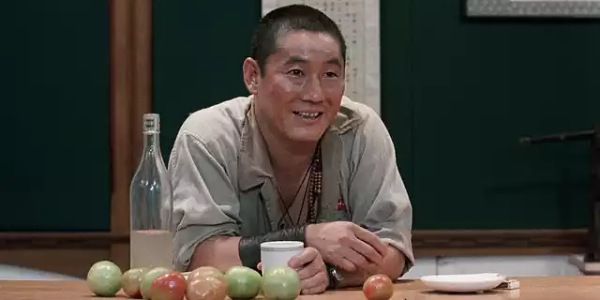
As stated before, Merry Christmas, Mr. Lawrence is a film about culture shock and the cultural exchange taken to a dangerous degree. And for a movie with Christmas in the title, for most of the movie, Christmas is left out of the picture. But its most potent message towards the end is all about the holiday.
The “true” meaning of Christmas
I don’t want this to get schmaltzy. If the reader is looking for a cheesy and heartwarming fluff of a Christmas movie, then tune in to Lifetime or the Hallmark Channel for your saccharine holiday fare. But there is something to be said about the supposed sentiment behind Christmas. This is exhibited in a rather humorous and heartwarming scene with Hara is sitting at a desk in his office, a group of guards bringing in Celliers and Lawrence. The two men, haggard and expecting a beating, are greeted by a drunk Hara, giggling like a girl and proclaiming himself to be Santa Claus. During this impromptu little Christmas party, Hara announces that the two men were free to go. All seems bright until a little later on when Celliers is executed by a new commanding officer who takes Yanoi’s place. Before such an unfortunate event, both Hara and Yanoi show their kinder sides. (or at least as kind as a film about prisoners of war can be) Yanoi, grief-stricken by the execution, gives his regards to a dying Celliers and, in the form of ultimate respect, cuts off a lock of Celliers’ hair and bows in solemn admiration.
Fast forward to the film’s final scene, the war is over, and several of the Japanese officers are on trial for war crimes. One of those men was Sgt. Hara. Lawrence, giving his once begrudging friend the last visit, sits with Hara in his cell, and the two of them reminisce for a little while about the Christmas they had together. What starts as warm becomes heartbreaking as Hara, a once toxic man, is now as docile and as pleasant as a kitten, contemplates why he has to die when his crimes were “no worse than anyone else’s.” While saying this, the one who tears up the most is not Hara but Lawrence, they might have been good friends if things were different. In any other Christmas movie, reaching for such sentiment would be seen as a cheap attempt to pull at the heartstrings. But Merry Christmas, Mr. Lawrence has a sense of poignant solemnity in such scenes that is equal parts touching and sentimental without being mawkish. As Lawrence gives his final goodbye, a lump in his throat, his once captor-turned friend yells out, “Merry Christmas! Merry Christmas, Mr. Lawrence.”
While the film fades to black, I was touched, and I believe that the ultimate point and purpose of this film is not to act as an indictment of the Japanese but as a warning. Anyone can fall victim to fanaticism, to the us-versus-them mentality that can take hold when desperation and repression are calling the shots. I believe Oshima used a foreign holiday like Christmas to crack through the shell of militarism, even if just a little bit.
Merry Christmas, Mr. Lawrence is a beautiful film, and despite its grim subject matter, there is an underlying sense of warmth to it. And although Christmas makes a very short cameo of sorts in the movie, what is there regarding the holiday wraps up the film nicely with a bow. It took blood, sweat, and a lot of tears to get to the gift, but I, for one, am glad that such a film exists.
What do you think? Have you seen Merry Christmas, Mr. Lawrence? Is it a great war film or is it a great Christmas film? Let us know in the comments below!
Merry Christmas, Mr. Lawrence was released in theaters in 1983
Does content like this matter to you?
Become a Member and support film journalism. Unlock access to all of Film Inquiry`s great articles. Join a community of like-minded readers who are passionate about cinema - get access to our private members Network, give back to independent filmmakers, and more.
If there is one word that can sum up Dallas Marshall, it would be weird. He is a strange fellow who is also a writer, anime nerd, and film buff who can also talk for hours about mythology and out-there literature. He has been sighted at local used bookstores perusing for horror books and manga. He has also written a book about Japanese animation called Anime Adrenaline! Which can be found on Amazon. You can also catch him on his own website at www.Dallasthewriter.com












